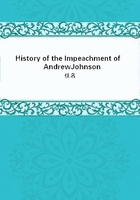
第65章 EXAMINATION OF WITNESSES AND THEIR TESTIMONY.(5)
So the testimony was not received, as it was shown in the debate thereon that it would prove nothing against the President which the prosecution had expected to prove.
No. 5.
Friday April 3rd, the Prosecution offered two telegraphic messages, one from Lewis E. Parsons to Andrew Johnson, and the other Mr. Johnson's answer, as follows:
Montgomery, Ala., Jan. 17, 1867.
Legislature in session. Efforts making to reconsider vote on Constitutional Amendment. Report from Washington says it is probable an enabling act will pass. We do not know what to believe. I find nothing here.
(The State Legislature had previously rejected the Constitutional Amendment.)The response is:
U. S. Military Telegraph. Executive Office, Washington D. C., Jan. 17, 1867.
What possible good can be obtained by reconsidering the Constitutional Amendment? I know of none in the present posture of affairs; and I do not believe that the people of the whole country will sustain any set of individuals in attempts to change the whole character of our Government by enabling acts or otherwise. I believe, on the contrary, that they will eventually uphold all who have patriotism and courage to stand by the Constitution, and who place their confidence in the people. There should be no faltering on the part of those who are honest in their determination to sustain the several co-ordinate Departments of the Government in accordance with its original design.
Andrew Johnson.
Hon. L. E. Parsons, Montgomery, Alabama.
The yeas and nays were demanded by Mr. Drake, and were as follows:
Yeas--Anthony, Cameron. Cattell, Chandler, Cole, Conkling, Conness, Corbett, Cragin, Drake, Henderson, Howard, Morgan, Morrill of Vermont, Nye, Patterson of New Hampshire, Pomeroy, Ramsay, Ross, Sherman, Sprague, Stewart, Sumner, Thayer, Tipton, Willey, Wilson--27--all Republicans.
Nays--Buckalew, Davis, Dixon, Doolittle, Edmunds, Ferry, Fessenden, Fowler, Frelinghuysen, McCreery, Morrill of Maine, Norton, Patterson of Tennessee, Trumbull, Van Winkle, Vickers, Williams--17--8 Democrats and 9 Republicans.
So the testimony was decided admissible, and was claimed by Mr.
Manager Boutwell to be in substantiation of the charges contained in the eleventh article.
No. 6.
The prosecution offered in evidence a copy of the Cleveland Leader, a newspaper purporting to contain a speech delivered by Mr. Johnson at the City of Cleveland, Ohio, on September 30th, 1866, as evidence against the President. It was objected to by the defense, and on the call by Mr. Conness and Mr. Sumner the yeas and nays were ordered, and the vote was as follows:
Yeas--Anthony, Cameron, Cattell. Chandler, Cole, Conkling, Conness, Corbett, Cragin, Drake, Edmunds, Ferry, Fessenden, Frelinghuysen, Henderson, Howard, Johnson, Morgan, Morrill of Maine, Morrill of Vermont, Norton, Nye, Patterson of New Hampshire, Pomeroy, Ramsay, Ross, Sherman, Sprague, Stewart, Sumner, Thayer, Tipton, Van Winkle, Willey, Williams--35--33Republicans and 2 Democrats.
Nays--Buckalew, Davis, Dixon, Doolittle, Fowler, Hendricks, Howe, McCreery, Patterson of Tennessee, Trumbull, Vickers--11--8Democrats and 3 Republicans.
So the evidence was received. It related to the tenth article, and was based on a certain speech delivered by Mr. Johnson at Cleveland, Ohio.
No. 7.
Saturday, April 10th, 1868, General Lorenzo Thomas on the stand, called by the Defense. Mr. Stanbery asked him, with reference to certain interviews with the President: What occurred between the President and yourself at that second interview on the 21st (February)?
Mr. Drake demanded the yeas and nays, and they were ordered and were as follows:
Yeas--Anthony, Bayard, Buckalew, Cattell, Cole, Conkling, Corbett, Davis, Dixon, Doolittle, Edmunds, Ferry, Fessenden, Fowler, Frelinghuysen, Grimes, Henderson, Hendricks, Howe, Johnson, McCreery, Morgan, Morrill of Maine, Morrill of Vermont, Morton, Norton, Patterson of New Hampshire, Patterson of Tennessee, Pomeroy, Ross, Sherman, Sprague, Stewart, Sumner, Tipton, Trumbull, Van Winkle, Vickers, Willey, Williams, Wilson, Yates--42-31 Republicans and 11 Democrats.
Nays--Cameron, Chandler, Conness, Cragin, Drake, Harlan, Howard, Nye, Ramsay, Thayer--10--all Republicans.
So the testimony was received, and General Thomas' answer was:
I stated to the President that I had delivered the communication, and that Mr. Stanton gave this answer: "Do you wish me to vacate at once, or will you give me time to take away my private property?" and that I replied, "At your pleasure." I then said that after delivering the copy of the letter to him, he said: "Ido not know whether I will obey your instructions or resist them." This I mentioned to the President. and his answer was:
"Very well, go and take charge of the office and perform the duties." * * *Question by Mr. Stanbery: What first happened to you the next morning?
Answer: The first thing that happened to me the next morning was the appearance at my house of the marshal of the district, with an assistant marshal and a constable, and he arrested me.
Question: What time in the morning was that?